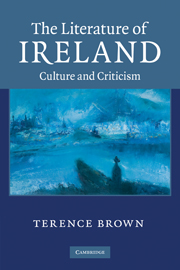Book contents
- Frontmatter
- Contents
- Acknowledgements
- Introduction
- 1 The Literary Revival: historical perspectives
- 2 Joyce's magic lantern
- 3 Music: the cultural issue
- 4 Modernism and revolution: rereading Yeats's ‘Easter 1916’
- 5 Shakespeare and the Irish self
- 6 Irish literature and the Great War
- 7 Ireland, Modernism and the 1930s
- 8 Post-modernists: Samuel Beckett and Flann O'Brien
- 9 Patrick Kavanagh: religious poet
- 10 MacNeice's Irelands: MacNeice's islands
- 11 Louis MacNeice and the Second World War
- 12 MacNeice and the puritan tradition
- 13 John Hewitt and memory: a reflection
- 14 Michael Longley and the Irish poetic tradition
- 15 Seamus Heaney: the witnessing eye and the speaking tongue
- 16 Derek Mahon: the poet and painting
- 17 Telling tales: Kennelly's Cromwell and Muldoon's ‘The More a Man Has the More a Man Wants’
- 18 Redeeming the time: John McGahern and John Banville
- 19 ‘Have we a context?’: transition, self and society in the theatre of Brian Friel
- 20 Hubert Butler and nationalism
- 21 The Irish Dylan Thomas: versions and influences
- Index
- References
12 - MacNeice and the puritan tradition
Published online by Cambridge University Press: 05 June 2012
- Frontmatter
- Contents
- Acknowledgements
- Introduction
- 1 The Literary Revival: historical perspectives
- 2 Joyce's magic lantern
- 3 Music: the cultural issue
- 4 Modernism and revolution: rereading Yeats's ‘Easter 1916’
- 5 Shakespeare and the Irish self
- 6 Irish literature and the Great War
- 7 Ireland, Modernism and the 1930s
- 8 Post-modernists: Samuel Beckett and Flann O'Brien
- 9 Patrick Kavanagh: religious poet
- 10 MacNeice's Irelands: MacNeice's islands
- 11 Louis MacNeice and the Second World War
- 12 MacNeice and the puritan tradition
- 13 John Hewitt and memory: a reflection
- 14 Michael Longley and the Irish poetic tradition
- 15 Seamus Heaney: the witnessing eye and the speaking tongue
- 16 Derek Mahon: the poet and painting
- 17 Telling tales: Kennelly's Cromwell and Muldoon's ‘The More a Man Has the More a Man Wants’
- 18 Redeeming the time: John McGahern and John Banville
- 19 ‘Have we a context?’: transition, self and society in the theatre of Brian Friel
- 20 Hubert Butler and nationalism
- 21 The Irish Dylan Thomas: versions and influences
- Index
- References
Summary
In 1935 MacNeice, in his essay ‘Poetry Today’, declared that ‘Whatever the “true function” of poetry is, there is something idolatrous or fetishistic about our pleasure in it.’ It was a daring admission in a decade when poetry was widely reckoned only admissible if it served some obviously ethical function. In contrast to the prevailing political puritanism of the period, MacNeice was unwilling to deny that poetry gives pleasure, and he knew that this fact to the puritan mind must seem a kind of idolatry, a worshipping of a false god, the making of a fetish of something insignificant and unworthy. However, for MacNeice the matter is, in the end, quite simple: ‘poetry qua poetry is an end and not a means; its relations to “life” are impossible to define; even when it is professedly “didactic”, “propagandist” or “satirical” the external purport is, ultimately, only a conventional property, a kind of perspective which many poets like to think of as essential’.
MacNeice in his twenties and early thirties, when he wrote his most searching essays on the role of poetry in such articles as the one quoted above, ‘Subject in Modern Poetry’ and in his book Modern Poetry: A Personal Essay (1938) was well-equipped to resist all those who would have made poetry subject to ethics or even to political necessity. For as an Ulsterman, he well understood that the impulse of the puritan sensibility is to suspect art and the pleasure it affords.
- Type
- Chapter
- Information
- The Literature of IrelandCulture and Criticism, pp. 156 - 169Publisher: Cambridge University PressPrint publication year: 2010



